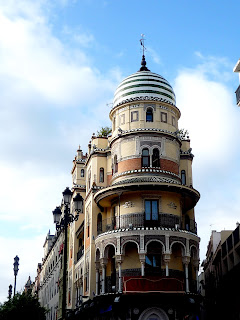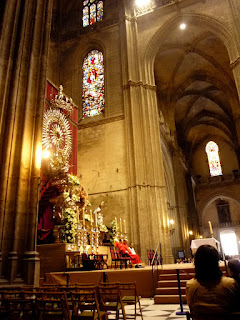Sevilla, or
Seville, is the capital of the southern province of Andalusia. It is also the
setting of at least three famous operas: The Barber of Seville, Don Giovanni,
and Carmen. Unfortunately the weather was a bit wet, but other than that I
enjoyed the sights.
I took a
train at 7:40am from the Renfe station in Malaga and reached Seville around
10:30. Because I’m cheap J
I decided to walk to my hostel instead of figuring out public transit, also
reasoning that I would see more of the city that way.
 |
| Bright-eyed and bushy-tailed on the train :) |
 |
| Spanish country-side... |
 |
| ...one of the hundreds of churches everywhere. |
One of the first things I
did was invest in an umbrella and get breakfast, a croissant and chocolate. Delicious!
 |
| so yummy!! |
While eating I read through the "things to do in Seville" from my guide book. After that, on my “way” to finding the hostel, I explored the Plaza Espana where
the Andalucian government ministry offices are
 |
| I'm getting good at asking people to take my photo, or setting the camera on self-timer :P |
I passed by the building which used to
be the Seville Cigar factory and is where, legend has it, Carmen the gypsy girl from the opera worked. Now it
houses a faculty of the Seville University.
 |
| Statue of King Ferdinand in front of the old cigar factory |
My next discovery was the Plaza del Toro. Seville is famous for its bull-fighting season which begins in April
with a two week long Fiesta. The description the guide gave of
the art of bullfighting is a bit reminiscent of ancient Roman gladiator games.
The bull is always killed, but the audience decides by waving white handkerchiefs
(or not) if the bullfighter has fought well enough to leave by the Gate of Honor. Apparently the Spanish public is very hard to please. During last
year’s season only one fighter had the honor of winning their approval.
 |
| El Torero |
 |
| The arena seats around 3 thousand people. Seat prices vary depending on how close they are to the ring and if they are on the shady or sunny side. Shade costs more! |
 |
| Stone benches... if you come for a show, you might want to bring a cushion! |
 |
| Puerta del Toro - Where the bull makes his entrance |
 |
| Poster from the mid-19th century |
 |
| Spanish people also love their sweets and pastries |
 |
| Proudly announcing that they supply the Royal family. |
 |
| Walking routes to see monuments featured in operas :) |
The next morning, being an
early-bird I ventured out around 8:30am the next morning and decided that old European cities
are nicest on a sunny morning with no people around.
 |
| Extravagant decoration |
 |
| Giralda Bell tower - it used to be the spire of a Mosque before the building was turned into a church |
The Royal castle, Alcazar,
opened at 9:30 and I was one of the first ones in. I almost felt like I had the
place to myself! There is something eerie but fascinating about exploring all
the corners of such an old place alone. It is entirely of stone graced with
Moorish arches, mosaic tile-work and plaster sculpture. The gardens are
stunning with shrubs in carefully laid out geometric patterns, flowers blooming
and fountains everywhere . I love the idea that I was walking where people like
Columbus, Queen Isabella, Magellan and other figures from history have walked.

After the
castle, I got lost in the maze of narrow streets and alleyways that make up the
Bario Santa Cruz, or old Jewish quarter of the city. Along the way I found churros y chocolate for snack!
The next
monument on my list was the Cathedral, but unfortunately it was closed for tourist visits because
of Palm Sunday. I really wanted to at least see inside so I joined the stream of people going to Mass at 1pm. The massive structure and space of Baroque
cathedrals will never cease to amaze me. I usually get a kink in my neck from
staring up for so long!
Mid-afternoon I joined the crowds of people eating at cafes in the sunshine and ordered fried fish and my favorite drink, tinto verano. Then I made my way to Plaza Nueva to see a procession.
I discovered very quickly that this week before Easter, Semana Santa – Holy Week, is very important for the Spanish Catholic church. Beginning on Palm Sunday there are processions every day, starting later in the after noon and sometimes going until midnight. There are hundreds of candles, lace, yards and yards of lace and velvet, gold and silver moulding on everything and swirling clouds of incense. The atmosphere is solemn and incredibly lavish and imposing.
I still have not been able to discover the origins of the
pointed hats, but I know that the people wearing them are the penitants,
grieving for their sins. Each procession usually has two floats: one of the
suffering Christ, in some stage of the Passion, and the other of Mary dressed
in a rich gown and surrounded by flowers and candles. It is a special honor
to help carry the floats, and the men who are under there wear sack-cloth on
their heads. Some of the participants even walk bare-foot to show their
penitence. In every city each procession starts at its respective church, and
makes its way through the main streets into the Cathedral and out the Puerta
del Perdon, or Door of Forgiveness and then back to the church it came from. It
can take as long as 5 or 6 hours.
In the
evening, after a light supper of tapas, two people from the hostel and I headed
to a plaza to see a procession come out of a church. There was a staggering
number of people crammed into the plaza and we literally couldn’t see anything
until we noticed people who had climbed up onto the pedestal of the statue in the
center of the plaza. We did likewise and enjoyed a great view, but
unfortunately the procession was canceled. There were so many people there was
no way to make a path through the crowd for the procession! To make up for the disappointment we
got icecream J
 |
| It's hard to know how many people are out because of religious fervour, and how many are there just for the party. |
 |
| Romaine, Charlotte, Quentin |




















No comments:
Post a Comment